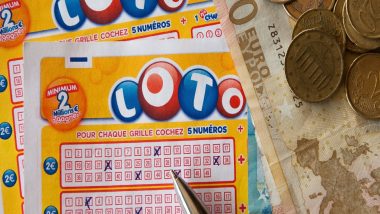International Lottery
International Lotteries vs. Lottery Scams How to tell the difference between a government operated lottery, an International lottery, and a scam letter that says you won the lottery. Note: It is illegal for US Citizens to enter foreign lotteries: Federal Statute. International Lottery & Totalizator Systems, Inc. (ILTS) is committed to providing the most innovative, most reliable, and best-performing gaming and digital voting systems to customers worldwide. In addition, the company strives to deliver exceptional service and ongoing support that maximizes customer profitability and satisfaction while.
- International Lottery Laws
- International Lottery Results
- Facebook International Lottery Winners
- International Lottery Online
- International Lottery Company
Mega Millions scams usually come in the form of advance-fee fraud schemes, which involve a fraudster falsely contacting individuals claiming that they are due a large sum of money.
I had John maxwell senior admn. For Facebook international lottery! Said I won 950,000,000!! Also, wanted my money fees put on google play card. Thank God I did not!! They wanted 270.00$ Beware people! This is just the cruelest scam!!!
On this page, you will find the various types of scams that lottery players should be aware of and tips on how to avoid them. It is important to note that it is not possible to win a prize for a lottery that you have not entered and Mega Millions representatives will never contact you regarding a win or fees before you receive your winnings.


How to Identify a Mega Millions Scam
Mega Millions scams take various forms, but here are some key features to look out for:
- Poor quality and incorrect grammar in a letter or email. The letter or email may be addressed to 'email holder' or 'winner' or 'reader', rather than using the victim's name.
- Some mail and email scams can look authentic, as scammers illegitimately use Mega Millions branding to persuade victims.
- The victim may receive a fake check, which can be attached to an email or letter and the fraudster might claim that it is for 'government taxes' or 'expenses'.
- The correspondence sent to the victim will emphasise that they should act to claim their prize as soon as possible and urges them to keep it 'confidential'. This is to make sure that the person who received the correspondence does not seek advice from others, which may expose the scam.
- The victim is asked to pay a 'processing fee' or 'tax' to be able to receive their winnings.
Types of Mega Millions Scams
Mega Millions scams can take five different forms:
An email is sent to the victim, letting them know that they have won a large sum of prize money and it asks them to pay 'fees' or 'taxes' if they want to receive the full prize winnings. A link to a website where prizes can be 'claimed' may also be included in the email, which could be used for 'phishing' personal information or installing spyware on the victim's computer, giving the criminal access to private information.
International Lottery Laws
Similar to email scams, a mail scam will try to convince the victim that they have won a huge sum of money and that they need to mail back a portion to be able to receive the full sum.
Phone
The fraudster calls the victim to notify them that they have won a large Mega Millions prize in the hope that they will agree to paying any 'fees' or 'taxes' to release the money. Scammers often use specific area codes that look like domestic U.S. phone numbers to trick victims, including; 876 (Jamaica), 473 (Grenada) and 268 (Antigua).
Scammers may also attempt to find out the victim’s bank details in order to access their accounts illicitly.
Cell Phone
Scammers send a text message to the victim from an unknown number telling them that they have won a Mega Millions prize. To claim the prize, victims are requested to call the number back, often on a premium rate number.
International Lottery Results
Social Media
The victim receives a message on their personal Facebook, Twitter or another social media platform notifying them that they have been selected to win a Mega Millions prize. They are then told to act immediately and follow a specific, often malicious, link to claim the prize.
How to Report a Lottery Scam
Facebook International Lottery Winners
If you believe you have been contacted by a Mega Millions scammer, it is very important that you do not provide personal or financial information. If you already have, contact your bank as soon as possible to minimize the risk of identity fraud.
International Lottery Online
To report a lottery scam, you can contact your state's Attorney General using the list provided by the National Association of Attorneys General: http://www.naag.org/naag/attorneys-general/whos-my-ag.php
International Lottery Company
Complaints can also be sent to the FTC (Federal Trade Commission), a consumer protection agency: https://www.ftccomplaintassistant.gov